The Critical Need for Ethical Conduct Among Accountants
VerifiedAdded on 2020/05/28
|10
|1986
|154
Essay
AI Summary
This essay thoroughly examines the critical need for ethical accountants in the financial field. It begins by emphasizing the importance of ethical behavior for accountants, who manage crucial financial details and influence investment decisions. The essay explores the consequences of unethical practices, referencing real-world examples such as the collapses of major corporations like Enron and WorldCom. It reviews literature on the subject, including studies on ethics education in accounting curricula and the impact of ethical interventions. The discussion covers official accounting standards, conflicts of interest, and codes of conduct, including those in Australia. The conclusion stresses that a lack of ethics can lead to organizational failures, highlighting the responsibility accountants have in maintaining financial records. The essay underscores the necessity for accountants to uphold high ethical standards to ensure healthy economic scenarios and maintain public trust. This assignment, available on Desklib, provides valuable insights into the ethical dimensions of accountancy.
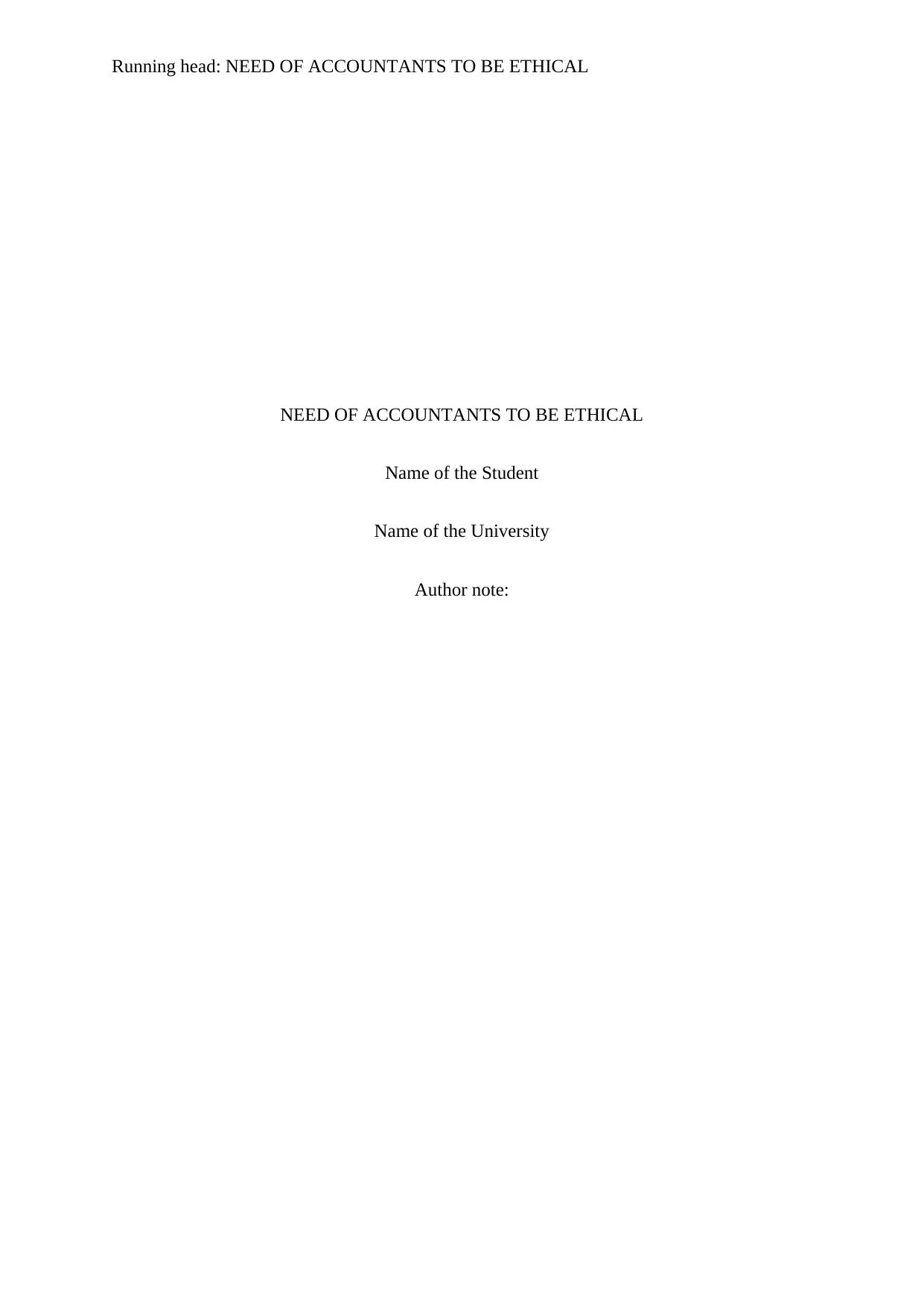
Running head: NEED OF ACCOUNTANTS TO BE ETHICAL
NEED OF ACCOUNTANTS TO BE ETHICAL
Name of the Student
Name of the University
Author note:
NEED OF ACCOUNTANTS TO BE ETHICAL
Name of the Student
Name of the University
Author note:
Paraphrase This Document
Need a fresh take? Get an instant paraphrase of this document with our AI Paraphraser
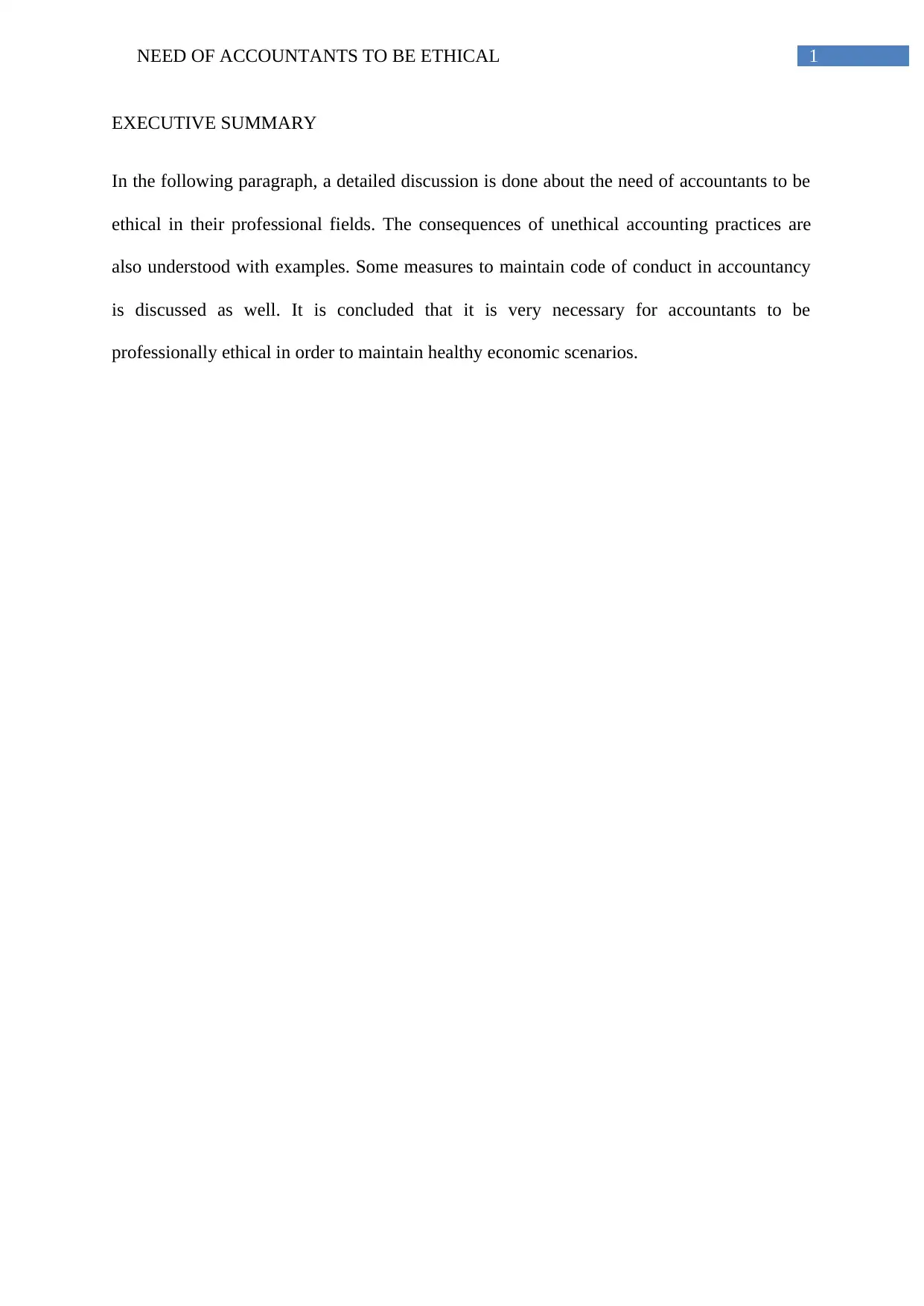
1NEED OF ACCOUNTANTS TO BE ETHICAL
EXECUTIVE SUMMARY
In the following paragraph, a detailed discussion is done about the need of accountants to be
ethical in their professional fields. The consequences of unethical accounting practices are
also understood with examples. Some measures to maintain code of conduct in accountancy
is discussed as well. It is concluded that it is very necessary for accountants to be
professionally ethical in order to maintain healthy economic scenarios.
EXECUTIVE SUMMARY
In the following paragraph, a detailed discussion is done about the need of accountants to be
ethical in their professional fields. The consequences of unethical accounting practices are
also understood with examples. Some measures to maintain code of conduct in accountancy
is discussed as well. It is concluded that it is very necessary for accountants to be
professionally ethical in order to maintain healthy economic scenarios.
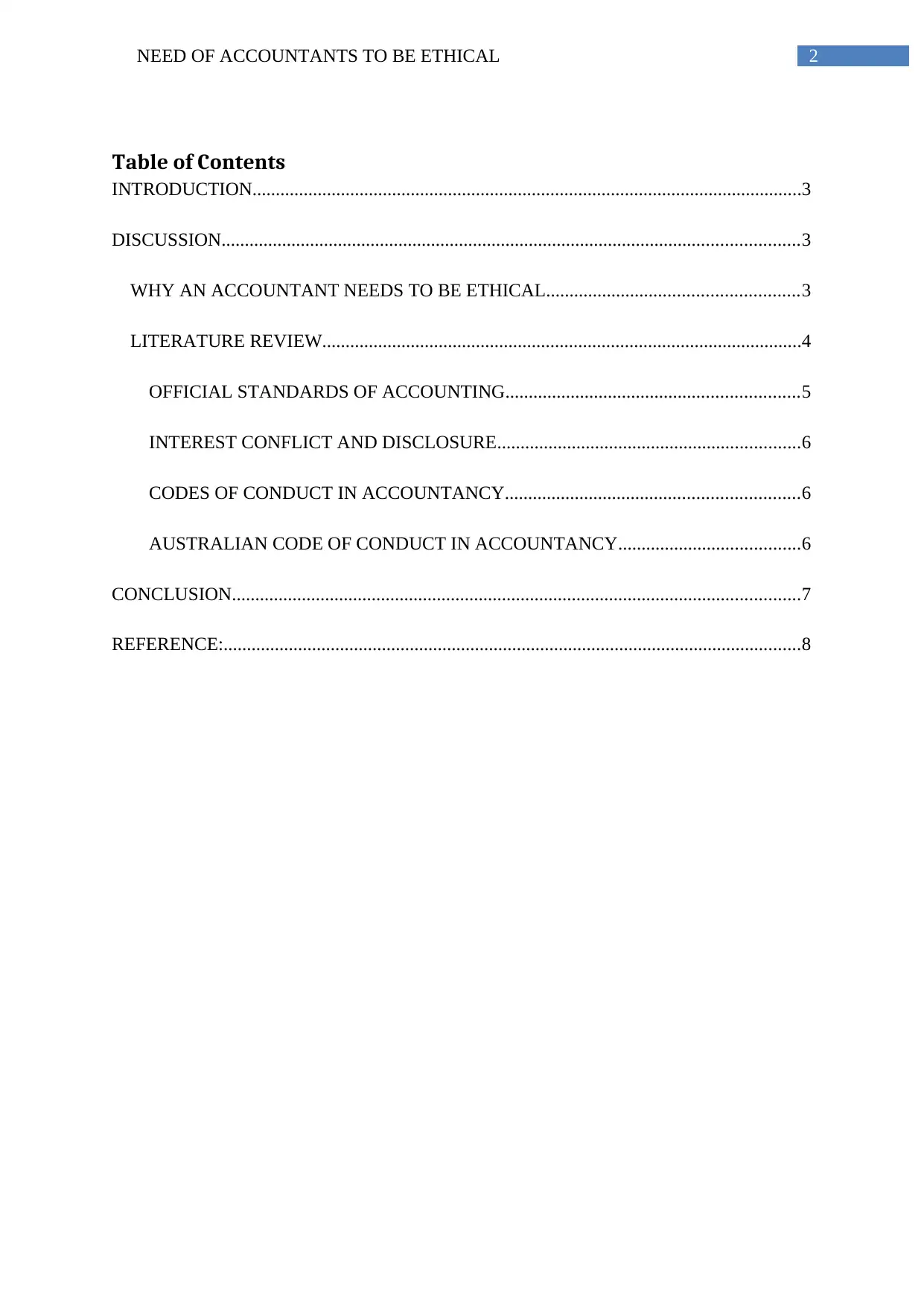
2NEED OF ACCOUNTANTS TO BE ETHICAL
Table of Contents
INTRODUCTION......................................................................................................................3
DISCUSSION............................................................................................................................3
WHY AN ACCOUNTANT NEEDS TO BE ETHICAL......................................................3
LITERATURE REVIEW.......................................................................................................4
OFFICIAL STANDARDS OF ACCOUNTING...............................................................5
INTEREST CONFLICT AND DISCLOSURE.................................................................6
CODES OF CONDUCT IN ACCOUNTANCY...............................................................6
AUSTRALIAN CODE OF CONDUCT IN ACCOUNTANCY.......................................6
CONCLUSION..........................................................................................................................7
REFERENCE:............................................................................................................................8
Table of Contents
INTRODUCTION......................................................................................................................3
DISCUSSION............................................................................................................................3
WHY AN ACCOUNTANT NEEDS TO BE ETHICAL......................................................3
LITERATURE REVIEW.......................................................................................................4
OFFICIAL STANDARDS OF ACCOUNTING...............................................................5
INTEREST CONFLICT AND DISCLOSURE.................................................................6
CODES OF CONDUCT IN ACCOUNTANCY...............................................................6
AUSTRALIAN CODE OF CONDUCT IN ACCOUNTANCY.......................................6
CONCLUSION..........................................................................................................................7
REFERENCE:............................................................................................................................8
⊘ This is a preview!⊘
Do you want full access?
Subscribe today to unlock all pages.

Trusted by 1+ million students worldwide
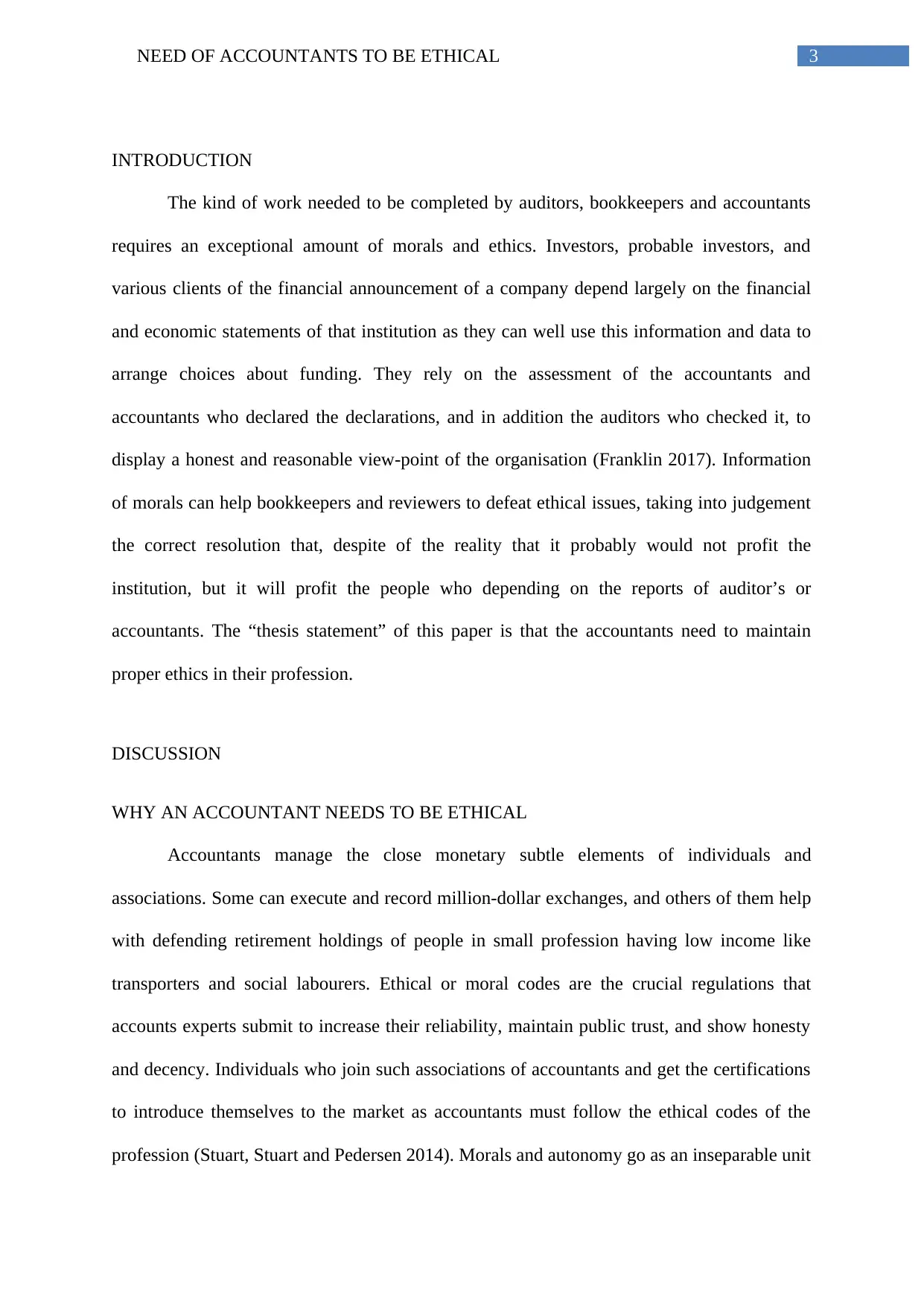
3NEED OF ACCOUNTANTS TO BE ETHICAL
INTRODUCTION
The kind of work needed to be completed by auditors, bookkeepers and accountants
requires an exceptional amount of morals and ethics. Investors, probable investors, and
various clients of the financial announcement of a company depend largely on the financial
and economic statements of that institution as they can well use this information and data to
arrange choices about funding. They rely on the assessment of the accountants and
accountants who declared the declarations, and in addition the auditors who checked it, to
display a honest and reasonable view-point of the organisation (Franklin 2017). Information
of morals can help bookkeepers and reviewers to defeat ethical issues, taking into judgement
the correct resolution that, despite of the reality that it probably would not profit the
institution, but it will profit the people who depending on the reports of auditor’s or
accountants. The “thesis statement” of this paper is that the accountants need to maintain
proper ethics in their profession.
DISCUSSION
WHY AN ACCOUNTANT NEEDS TO BE ETHICAL
Accountants manage the close monetary subtle elements of individuals and
associations. Some can execute and record million-dollar exchanges, and others of them help
with defending retirement holdings of people in small profession having low income like
transporters and social labourers. Ethical or moral codes are the crucial regulations that
accounts experts submit to increase their reliability, maintain public trust, and show honesty
and decency. Individuals who join such associations of accountants and get the certifications
to introduce themselves to the market as accountants must follow the ethical codes of the
profession (Stuart, Stuart and Pedersen 2014). Morals and autonomy go as an inseparable unit
INTRODUCTION
The kind of work needed to be completed by auditors, bookkeepers and accountants
requires an exceptional amount of morals and ethics. Investors, probable investors, and
various clients of the financial announcement of a company depend largely on the financial
and economic statements of that institution as they can well use this information and data to
arrange choices about funding. They rely on the assessment of the accountants and
accountants who declared the declarations, and in addition the auditors who checked it, to
display a honest and reasonable view-point of the organisation (Franklin 2017). Information
of morals can help bookkeepers and reviewers to defeat ethical issues, taking into judgement
the correct resolution that, despite of the reality that it probably would not profit the
institution, but it will profit the people who depending on the reports of auditor’s or
accountants. The “thesis statement” of this paper is that the accountants need to maintain
proper ethics in their profession.
DISCUSSION
WHY AN ACCOUNTANT NEEDS TO BE ETHICAL
Accountants manage the close monetary subtle elements of individuals and
associations. Some can execute and record million-dollar exchanges, and others of them help
with defending retirement holdings of people in small profession having low income like
transporters and social labourers. Ethical or moral codes are the crucial regulations that
accounts experts submit to increase their reliability, maintain public trust, and show honesty
and decency. Individuals who join such associations of accountants and get the certifications
to introduce themselves to the market as accountants must follow the ethical codes of the
profession (Stuart, Stuart and Pedersen 2014). Morals and autonomy go as an inseparable unit
Paraphrase This Document
Need a fresh take? Get an instant paraphrase of this document with our AI Paraphraser
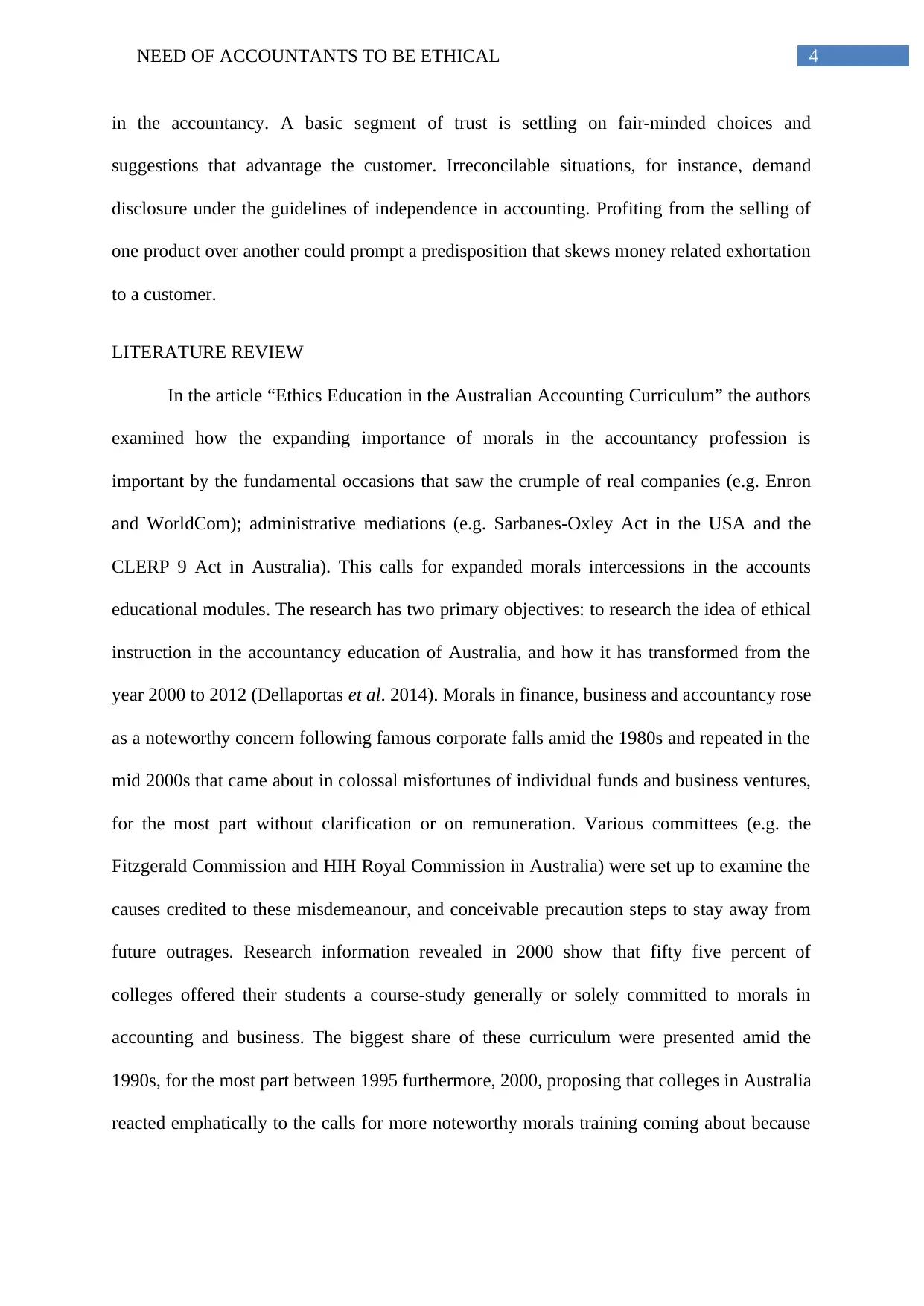
4NEED OF ACCOUNTANTS TO BE ETHICAL
in the accountancy. A basic segment of trust is settling on fair-minded choices and
suggestions that advantage the customer. Irreconcilable situations, for instance, demand
disclosure under the guidelines of independence in accounting. Profiting from the selling of
one product over another could prompt a predisposition that skews money related exhortation
to a customer.
LITERATURE REVIEW
In the article “Ethics Education in the Australian Accounting Curriculum” the authors
examined how the expanding importance of morals in the accountancy profession is
important by the fundamental occasions that saw the crumple of real companies (e.g. Enron
and WorldCom); administrative mediations (e.g. Sarbanes-Oxley Act in the USA and the
CLERP 9 Act in Australia). This calls for expanded morals intercessions in the accounts
educational modules. The research has two primary objectives: to research the idea of ethical
instruction in the accountancy education of Australia, and how it has transformed from the
year 2000 to 2012 (Dellaportas et al. 2014). Morals in finance, business and accountancy rose
as a noteworthy concern following famous corporate falls amid the 1980s and repeated in the
mid 2000s that came about in colossal misfortunes of individual funds and business ventures,
for the most part without clarification or on remuneration. Various committees (e.g. the
Fitzgerald Commission and HIH Royal Commission in Australia) were set up to examine the
causes credited to these misdemeanour, and conceivable precaution steps to stay away from
future outrages. Research information revealed in 2000 show that fifty five percent of
colleges offered their students a course-study generally or solely committed to morals in
accounting and business. The biggest share of these curriculum were presented amid the
1990s, for the most part between 1995 furthermore, 2000, proposing that colleges in Australia
reacted emphatically to the calls for more noteworthy morals training coming about because
in the accountancy. A basic segment of trust is settling on fair-minded choices and
suggestions that advantage the customer. Irreconcilable situations, for instance, demand
disclosure under the guidelines of independence in accounting. Profiting from the selling of
one product over another could prompt a predisposition that skews money related exhortation
to a customer.
LITERATURE REVIEW
In the article “Ethics Education in the Australian Accounting Curriculum” the authors
examined how the expanding importance of morals in the accountancy profession is
important by the fundamental occasions that saw the crumple of real companies (e.g. Enron
and WorldCom); administrative mediations (e.g. Sarbanes-Oxley Act in the USA and the
CLERP 9 Act in Australia). This calls for expanded morals intercessions in the accounts
educational modules. The research has two primary objectives: to research the idea of ethical
instruction in the accountancy education of Australia, and how it has transformed from the
year 2000 to 2012 (Dellaportas et al. 2014). Morals in finance, business and accountancy rose
as a noteworthy concern following famous corporate falls amid the 1980s and repeated in the
mid 2000s that came about in colossal misfortunes of individual funds and business ventures,
for the most part without clarification or on remuneration. Various committees (e.g. the
Fitzgerald Commission and HIH Royal Commission in Australia) were set up to examine the
causes credited to these misdemeanour, and conceivable precaution steps to stay away from
future outrages. Research information revealed in 2000 show that fifty five percent of
colleges offered their students a course-study generally or solely committed to morals in
accounting and business. The biggest share of these curriculum were presented amid the
1990s, for the most part between 1995 furthermore, 2000, proposing that colleges in Australia
reacted emphatically to the calls for more noteworthy morals training coming about because
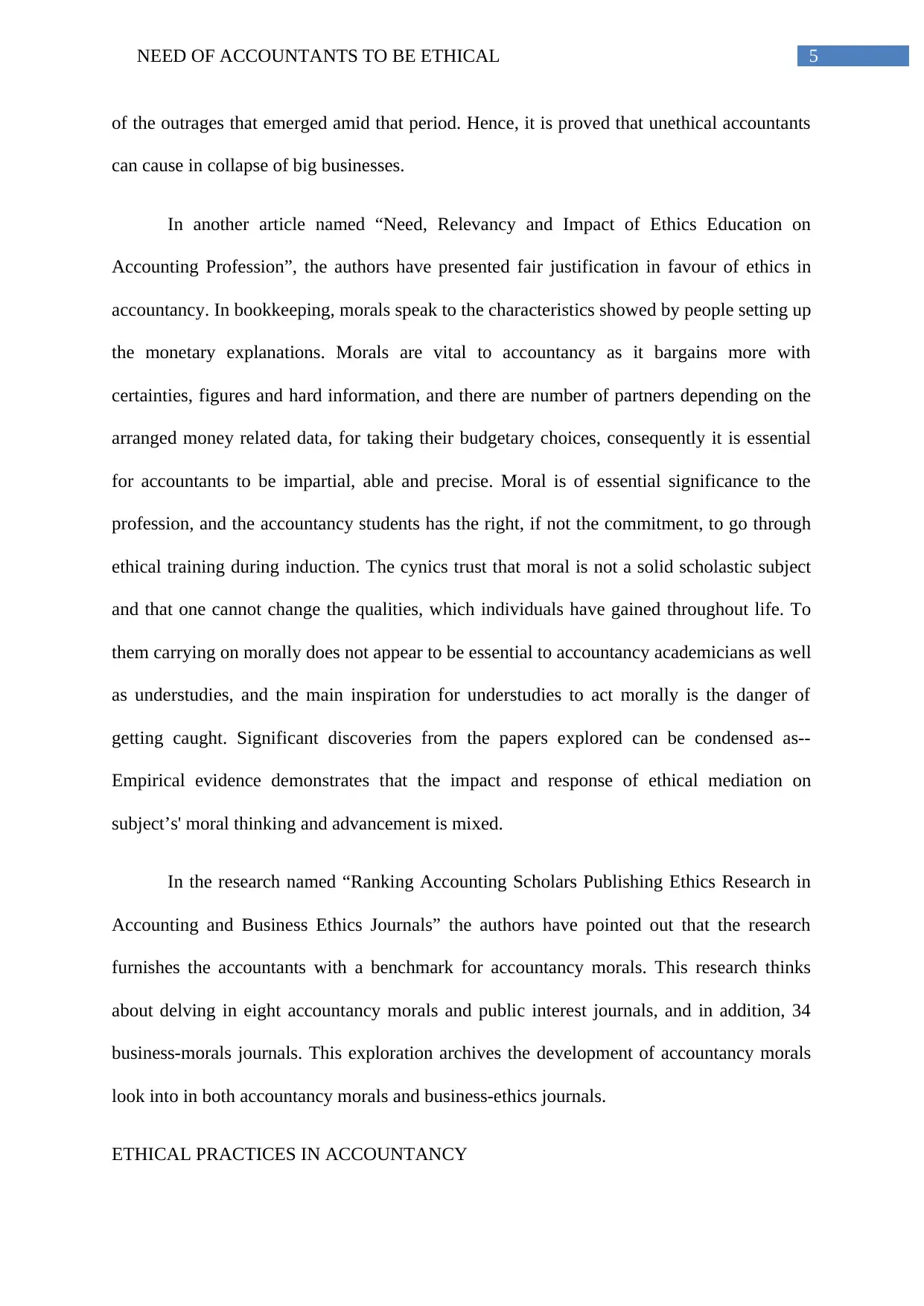
5NEED OF ACCOUNTANTS TO BE ETHICAL
of the outrages that emerged amid that period. Hence, it is proved that unethical accountants
can cause in collapse of big businesses.
In another article named “Need, Relevancy and Impact of Ethics Education on
Accounting Profession”, the authors have presented fair justification in favour of ethics in
accountancy. In bookkeeping, morals speak to the characteristics showed by people setting up
the monetary explanations. Morals are vital to accountancy as it bargains more with
certainties, figures and hard information, and there are number of partners depending on the
arranged money related data, for taking their budgetary choices, consequently it is essential
for accountants to be impartial, able and precise. Moral is of essential significance to the
profession, and the accountancy students has the right, if not the commitment, to go through
ethical training during induction. The cynics trust that moral is not a solid scholastic subject
and that one cannot change the qualities, which individuals have gained throughout life. To
them carrying on morally does not appear to be essential to accountancy academicians as well
as understudies, and the main inspiration for understudies to act morally is the danger of
getting caught. Significant discoveries from the papers explored can be condensed as--
Empirical evidence demonstrates that the impact and response of ethical mediation on
subject’s' moral thinking and advancement is mixed.
In the research named “Ranking Accounting Scholars Publishing Ethics Research in
Accounting and Business Ethics Journals” the authors have pointed out that the research
furnishes the accountants with a benchmark for accountancy morals. This research thinks
about delving in eight accountancy morals and public interest journals, and in addition, 34
business-morals journals. This exploration archives the development of accountancy morals
look into in both accountancy morals and business-ethics journals.
ETHICAL PRACTICES IN ACCOUNTANCY
of the outrages that emerged amid that period. Hence, it is proved that unethical accountants
can cause in collapse of big businesses.
In another article named “Need, Relevancy and Impact of Ethics Education on
Accounting Profession”, the authors have presented fair justification in favour of ethics in
accountancy. In bookkeeping, morals speak to the characteristics showed by people setting up
the monetary explanations. Morals are vital to accountancy as it bargains more with
certainties, figures and hard information, and there are number of partners depending on the
arranged money related data, for taking their budgetary choices, consequently it is essential
for accountants to be impartial, able and precise. Moral is of essential significance to the
profession, and the accountancy students has the right, if not the commitment, to go through
ethical training during induction. The cynics trust that moral is not a solid scholastic subject
and that one cannot change the qualities, which individuals have gained throughout life. To
them carrying on morally does not appear to be essential to accountancy academicians as well
as understudies, and the main inspiration for understudies to act morally is the danger of
getting caught. Significant discoveries from the papers explored can be condensed as--
Empirical evidence demonstrates that the impact and response of ethical mediation on
subject’s' moral thinking and advancement is mixed.
In the research named “Ranking Accounting Scholars Publishing Ethics Research in
Accounting and Business Ethics Journals” the authors have pointed out that the research
furnishes the accountants with a benchmark for accountancy morals. This research thinks
about delving in eight accountancy morals and public interest journals, and in addition, 34
business-morals journals. This exploration archives the development of accountancy morals
look into in both accountancy morals and business-ethics journals.
ETHICAL PRACTICES IN ACCOUNTANCY
⊘ This is a preview!⊘
Do you want full access?
Subscribe today to unlock all pages.

Trusted by 1+ million students worldwide
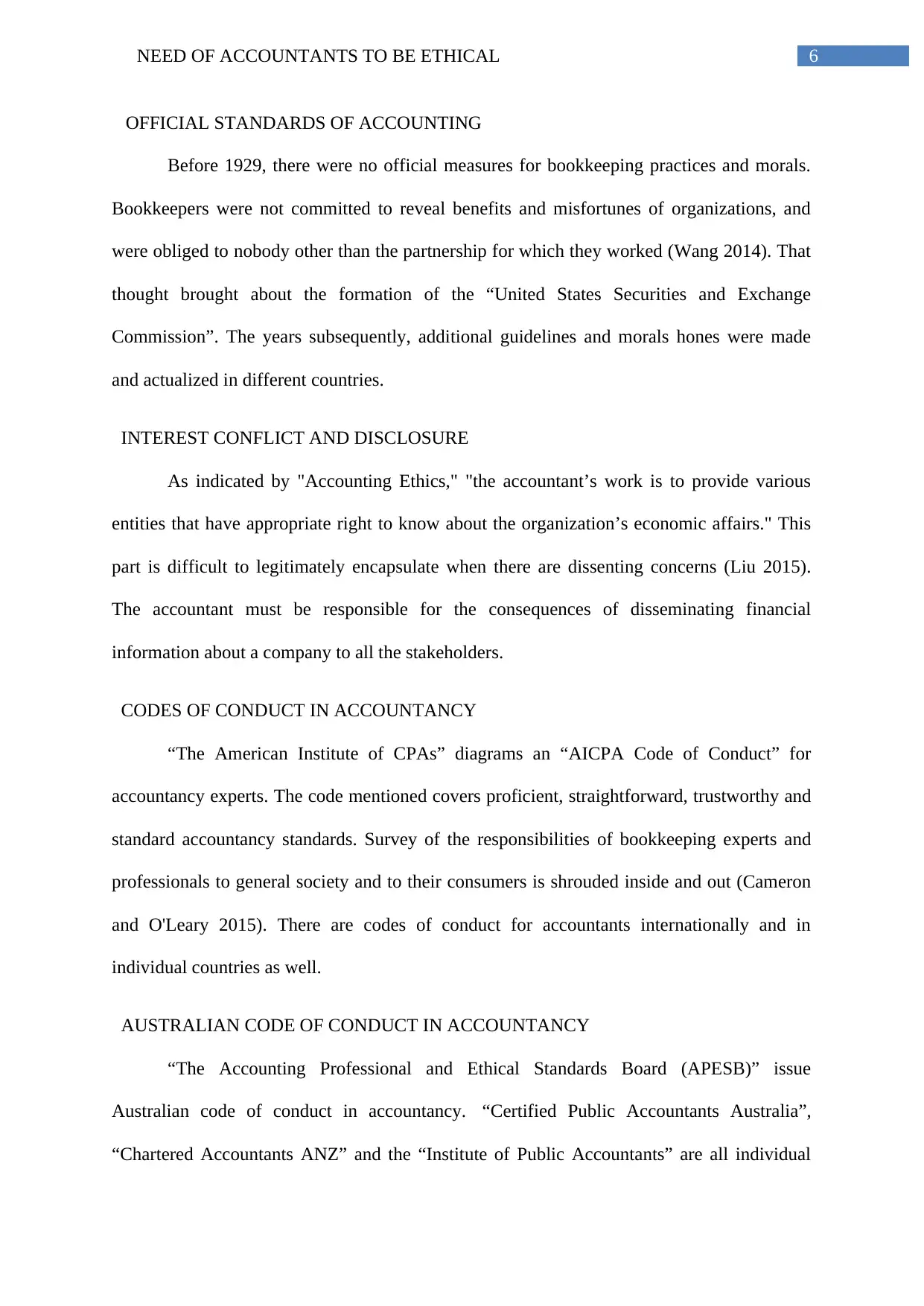
6NEED OF ACCOUNTANTS TO BE ETHICAL
OFFICIAL STANDARDS OF ACCOUNTING
Before 1929, there were no official measures for bookkeeping practices and morals.
Bookkeepers were not committed to reveal benefits and misfortunes of organizations, and
were obliged to nobody other than the partnership for which they worked (Wang 2014). That
thought brought about the formation of the “United States Securities and Exchange
Commission”. The years subsequently, additional guidelines and morals hones were made
and actualized in different countries.
INTEREST CONFLICT AND DISCLOSURE
As indicated by "Accounting Ethics," "the accountant’s work is to provide various
entities that have appropriate right to know about the organization’s economic affairs." This
part is difficult to legitimately encapsulate when there are dissenting concerns (Liu 2015).
The accountant must be responsible for the consequences of disseminating financial
information about a company to all the stakeholders.
CODES OF CONDUCT IN ACCOUNTANCY
“The American Institute of CPAs” diagrams an “AICPA Code of Conduct” for
accountancy experts. The code mentioned covers proficient, straightforward, trustworthy and
standard accountancy standards. Survey of the responsibilities of bookkeeping experts and
professionals to general society and to their consumers is shrouded inside and out (Cameron
and O'Leary 2015). There are codes of conduct for accountants internationally and in
individual countries as well.
AUSTRALIAN CODE OF CONDUCT IN ACCOUNTANCY
“The Accounting Professional and Ethical Standards Board (APESB)” issue
Australian code of conduct in accountancy. “Certified Public Accountants Australia”,
“Chartered Accountants ANZ” and the “Institute of Public Accountants” are all individual
OFFICIAL STANDARDS OF ACCOUNTING
Before 1929, there were no official measures for bookkeeping practices and morals.
Bookkeepers were not committed to reveal benefits and misfortunes of organizations, and
were obliged to nobody other than the partnership for which they worked (Wang 2014). That
thought brought about the formation of the “United States Securities and Exchange
Commission”. The years subsequently, additional guidelines and morals hones were made
and actualized in different countries.
INTEREST CONFLICT AND DISCLOSURE
As indicated by "Accounting Ethics," "the accountant’s work is to provide various
entities that have appropriate right to know about the organization’s economic affairs." This
part is difficult to legitimately encapsulate when there are dissenting concerns (Liu 2015).
The accountant must be responsible for the consequences of disseminating financial
information about a company to all the stakeholders.
CODES OF CONDUCT IN ACCOUNTANCY
“The American Institute of CPAs” diagrams an “AICPA Code of Conduct” for
accountancy experts. The code mentioned covers proficient, straightforward, trustworthy and
standard accountancy standards. Survey of the responsibilities of bookkeeping experts and
professionals to general society and to their consumers is shrouded inside and out (Cameron
and O'Leary 2015). There are codes of conduct for accountants internationally and in
individual countries as well.
AUSTRALIAN CODE OF CONDUCT IN ACCOUNTANCY
“The Accounting Professional and Ethical Standards Board (APESB)” issue
Australian code of conduct in accountancy. “Certified Public Accountants Australia”,
“Chartered Accountants ANZ” and the “Institute of Public Accountants” are all individual
Paraphrase This Document
Need a fresh take? Get an instant paraphrase of this document with our AI Paraphraser
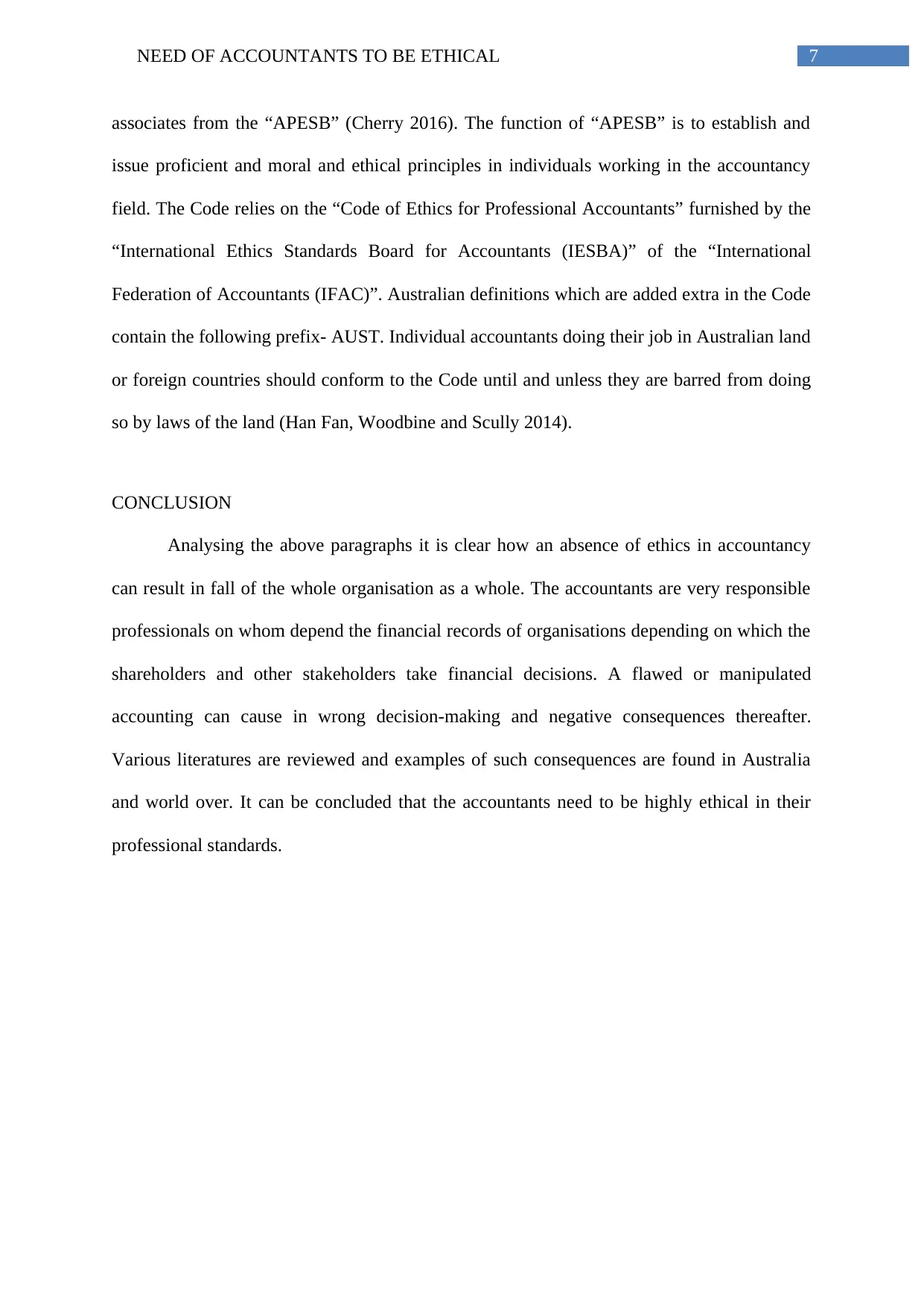
7NEED OF ACCOUNTANTS TO BE ETHICAL
associates from the “APESB” (Cherry 2016). The function of “APESB” is to establish and
issue proficient and moral and ethical principles in individuals working in the accountancy
field. The Code relies on the “Code of Ethics for Professional Accountants” furnished by the
“International Ethics Standards Board for Accountants (IESBA)” of the “International
Federation of Accountants (IFAC)”. Australian definitions which are added extra in the Code
contain the following prefix- AUST. Individual accountants doing their job in Australian land
or foreign countries should conform to the Code until and unless they are barred from doing
so by laws of the land (Han Fan, Woodbine and Scully 2014).
CONCLUSION
Analysing the above paragraphs it is clear how an absence of ethics in accountancy
can result in fall of the whole organisation as a whole. The accountants are very responsible
professionals on whom depend the financial records of organisations depending on which the
shareholders and other stakeholders take financial decisions. A flawed or manipulated
accounting can cause in wrong decision-making and negative consequences thereafter.
Various literatures are reviewed and examples of such consequences are found in Australia
and world over. It can be concluded that the accountants need to be highly ethical in their
professional standards.
associates from the “APESB” (Cherry 2016). The function of “APESB” is to establish and
issue proficient and moral and ethical principles in individuals working in the accountancy
field. The Code relies on the “Code of Ethics for Professional Accountants” furnished by the
“International Ethics Standards Board for Accountants (IESBA)” of the “International
Federation of Accountants (IFAC)”. Australian definitions which are added extra in the Code
contain the following prefix- AUST. Individual accountants doing their job in Australian land
or foreign countries should conform to the Code until and unless they are barred from doing
so by laws of the land (Han Fan, Woodbine and Scully 2014).
CONCLUSION
Analysing the above paragraphs it is clear how an absence of ethics in accountancy
can result in fall of the whole organisation as a whole. The accountants are very responsible
professionals on whom depend the financial records of organisations depending on which the
shareholders and other stakeholders take financial decisions. A flawed or manipulated
accounting can cause in wrong decision-making and negative consequences thereafter.
Various literatures are reviewed and examples of such consequences are found in Australia
and world over. It can be concluded that the accountants need to be highly ethical in their
professional standards.
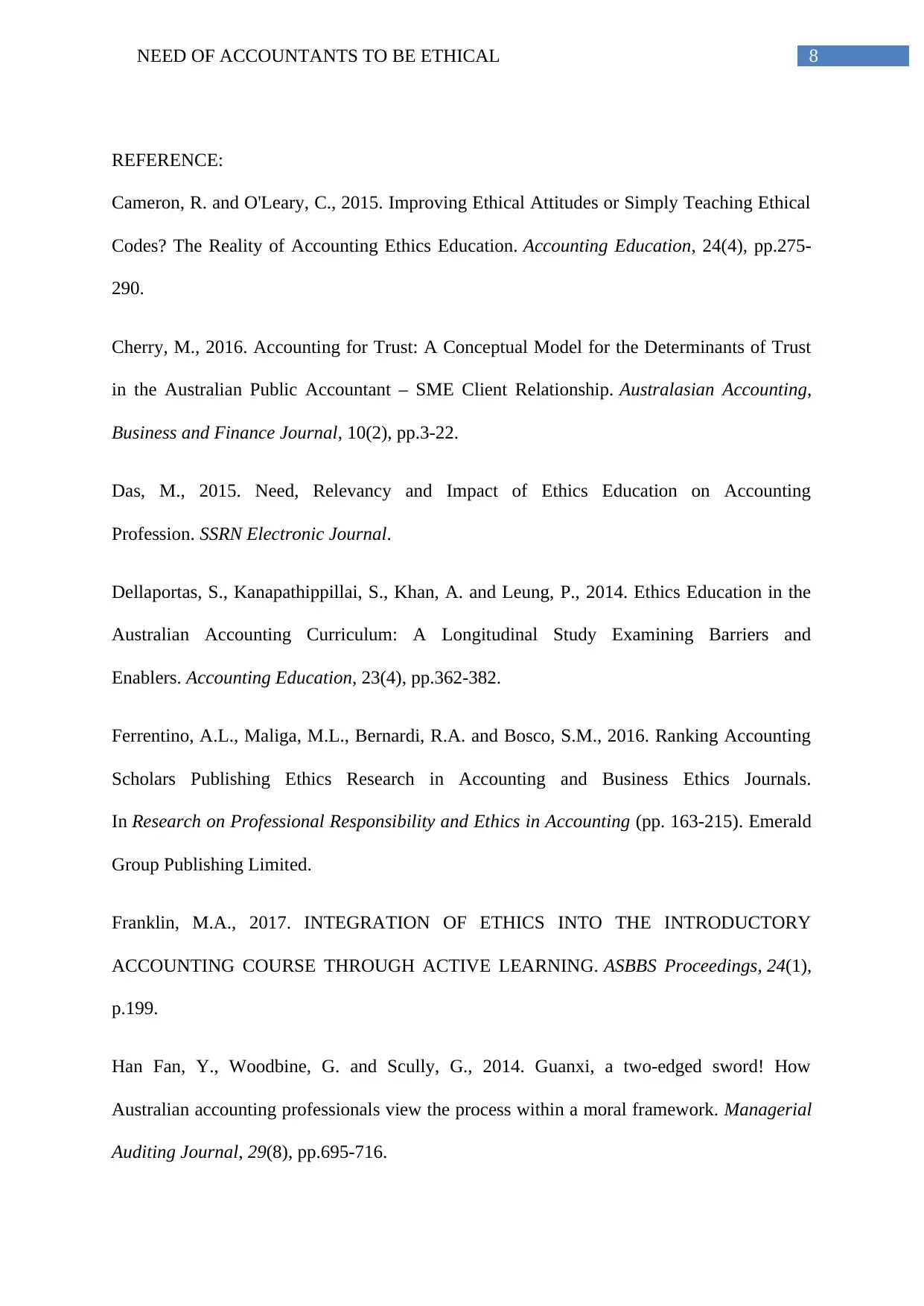
8NEED OF ACCOUNTANTS TO BE ETHICAL
REFERENCE:
Cameron, R. and O'Leary, C., 2015. Improving Ethical Attitudes or Simply Teaching Ethical
Codes? The Reality of Accounting Ethics Education. Accounting Education, 24(4), pp.275-
290.
Cherry, M., 2016. Accounting for Trust: A Conceptual Model for the Determinants of Trust
in the Australian Public Accountant – SME Client Relationship. Australasian Accounting,
Business and Finance Journal, 10(2), pp.3-22.
Das, M., 2015. Need, Relevancy and Impact of Ethics Education on Accounting
Profession. SSRN Electronic Journal.
Dellaportas, S., Kanapathippillai, S., Khan, A. and Leung, P., 2014. Ethics Education in the
Australian Accounting Curriculum: A Longitudinal Study Examining Barriers and
Enablers. Accounting Education, 23(4), pp.362-382.
Ferrentino, A.L., Maliga, M.L., Bernardi, R.A. and Bosco, S.M., 2016. Ranking Accounting
Scholars Publishing Ethics Research in Accounting and Business Ethics Journals.
In Research on Professional Responsibility and Ethics in Accounting (pp. 163-215). Emerald
Group Publishing Limited.
Franklin, M.A., 2017. INTEGRATION OF ETHICS INTO THE INTRODUCTORY
ACCOUNTING COURSE THROUGH ACTIVE LEARNING. ASBBS Proceedings, 24(1),
p.199.
Han Fan, Y., Woodbine, G. and Scully, G., 2014. Guanxi, a two-edged sword! How
Australian accounting professionals view the process within a moral framework. Managerial
Auditing Journal, 29(8), pp.695-716.
REFERENCE:
Cameron, R. and O'Leary, C., 2015. Improving Ethical Attitudes or Simply Teaching Ethical
Codes? The Reality of Accounting Ethics Education. Accounting Education, 24(4), pp.275-
290.
Cherry, M., 2016. Accounting for Trust: A Conceptual Model for the Determinants of Trust
in the Australian Public Accountant – SME Client Relationship. Australasian Accounting,
Business and Finance Journal, 10(2), pp.3-22.
Das, M., 2015. Need, Relevancy and Impact of Ethics Education on Accounting
Profession. SSRN Electronic Journal.
Dellaportas, S., Kanapathippillai, S., Khan, A. and Leung, P., 2014. Ethics Education in the
Australian Accounting Curriculum: A Longitudinal Study Examining Barriers and
Enablers. Accounting Education, 23(4), pp.362-382.
Ferrentino, A.L., Maliga, M.L., Bernardi, R.A. and Bosco, S.M., 2016. Ranking Accounting
Scholars Publishing Ethics Research in Accounting and Business Ethics Journals.
In Research on Professional Responsibility and Ethics in Accounting (pp. 163-215). Emerald
Group Publishing Limited.
Franklin, M.A., 2017. INTEGRATION OF ETHICS INTO THE INTRODUCTORY
ACCOUNTING COURSE THROUGH ACTIVE LEARNING. ASBBS Proceedings, 24(1),
p.199.
Han Fan, Y., Woodbine, G. and Scully, G., 2014. Guanxi, a two-edged sword! How
Australian accounting professionals view the process within a moral framework. Managerial
Auditing Journal, 29(8), pp.695-716.
⊘ This is a preview!⊘
Do you want full access?
Subscribe today to unlock all pages.

Trusted by 1+ million students worldwide
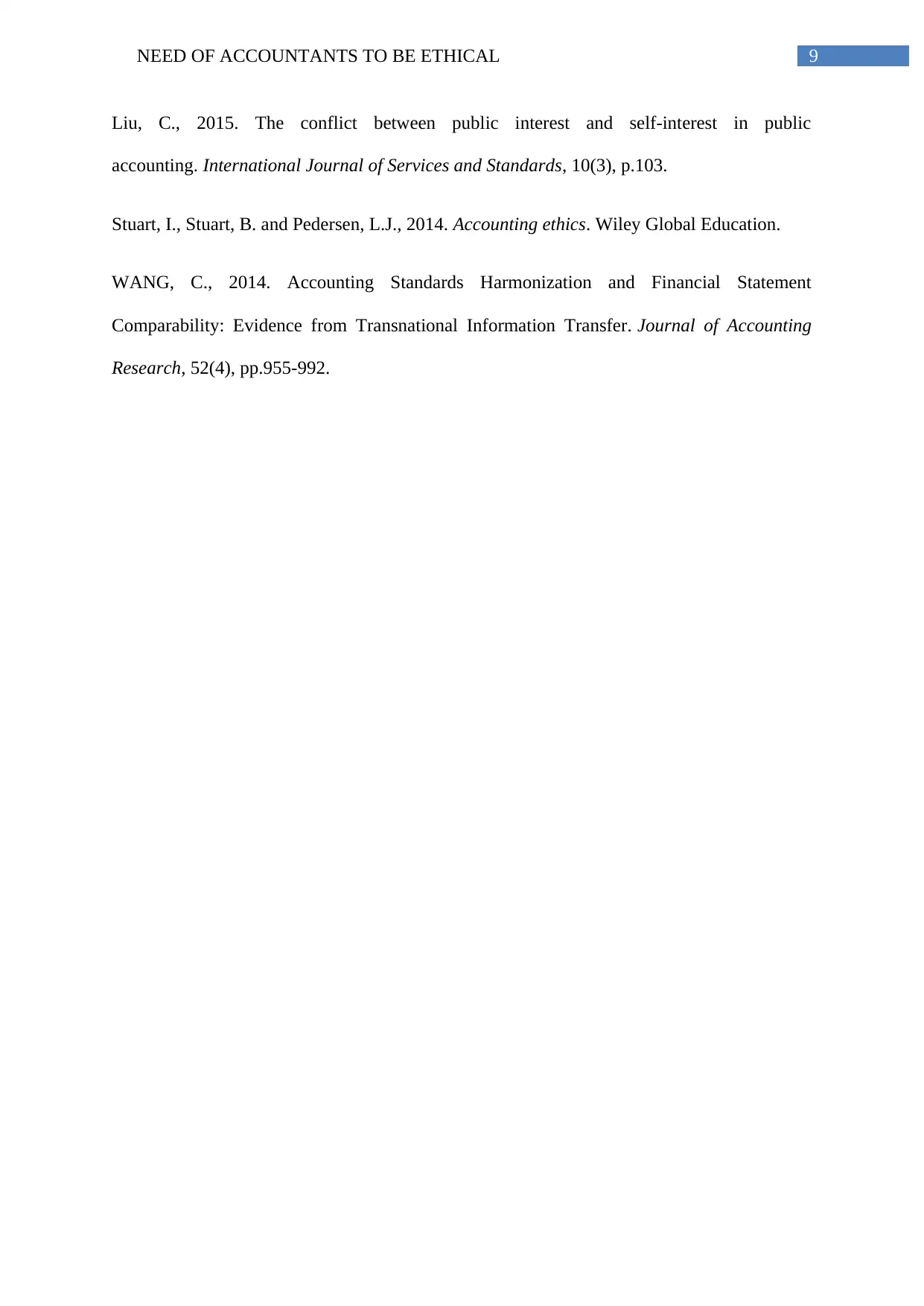
9NEED OF ACCOUNTANTS TO BE ETHICAL
Liu, C., 2015. The conflict between public interest and self-interest in public
accounting. International Journal of Services and Standards, 10(3), p.103.
Stuart, I., Stuart, B. and Pedersen, L.J., 2014. Accounting ethics. Wiley Global Education.
WANG, C., 2014. Accounting Standards Harmonization and Financial Statement
Comparability: Evidence from Transnational Information Transfer. Journal of Accounting
Research, 52(4), pp.955-992.
Liu, C., 2015. The conflict between public interest and self-interest in public
accounting. International Journal of Services and Standards, 10(3), p.103.
Stuart, I., Stuart, B. and Pedersen, L.J., 2014. Accounting ethics. Wiley Global Education.
WANG, C., 2014. Accounting Standards Harmonization and Financial Statement
Comparability: Evidence from Transnational Information Transfer. Journal of Accounting
Research, 52(4), pp.955-992.
1 out of 10
Related Documents
Your All-in-One AI-Powered Toolkit for Academic Success.
+13062052269
info@desklib.com
Available 24*7 on WhatsApp / Email
![[object Object]](/_next/static/media/star-bottom.7253800d.svg)
Unlock your academic potential
Copyright © 2020–2026 A2Z Services. All Rights Reserved. Developed and managed by ZUCOL.





